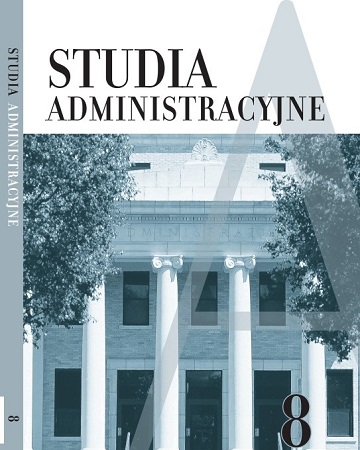





| Authors: |
Marta
Balcerek-Kosiarz
Zakład Badań Władzy Lokalnej i Samorządu Wydział Nauk Politycznych i Dziennikarstwa Uniwersytet im. A. Mickiewicza w Poznaniu |
| Keywords: | Governance Multi-level Governance local government Germany |
| Data publikacji całości: | 2018 |
| Page range: | 15 (51-65) |
| Downloads ?: | 464 |
| 1. | Ansell C., The networked policy. Regional development in Western Europe, „Governance” 2000, Vol. 13, Issue 2, s. 279–291. |
| 2. | Adamaschek B., Region-Regional Governance-Regionalentwicklung, w: idem, Regional Governance – von der kommunalen zur regionalen Strategie, Bertelsmann, Gütersloh 2003, s. 1–123. |
| 3. | Bevir M., SAGE Handbook of Governance, SAGE, London 2011. |
| 4. | Böcher M., Instrumentenwandel in der Umwelt- und Naturschutzpolitik und der Politik zur integrierten ländlichen Entwicklung. Theoretische Grundlagen und Strategien der Praxisumsetzung, Dissertation, Göttingen 2008. |
| 5. | Denters B., Rose L., Towards local governance?, w: Comparing Local Governance. Trends and Developments, red. B. Denters, L. Rose, Palgrave Mac Millan, New York 2005, s. 46–62. |
| 6. | Dolnicki B., Samorząd terytorialny, Zakamycze, Kraków 2006. |
| 7. | Fürst D., Regional Governance – ein neues Paradigma der Regionalwissenschaften?, „Raumforschung und Raumordnung” 2001, No. 59, s. 370–380. |
| 8. | Fürst D. Regional Governance, w: Governance – Regieren in komplexen Regelsystmen, red. A. Benz, VS Verlag für Sozialwissenschaften, Wiesbaden 2004, s. 49–69. |
| 9. | Giessen L., Regional Governance für ländliche Räume – innovativer Ansatz, politischer Gegenwind und der Weg vorwärtz, „Raumforschung und Raumordnung” 2010, Vol. 68, s. 3–14. |
| 10. | Giessen L., Böcher M., Rural Governance, forestry, and the promotion of local knowledge. The case of the German rural development programme „Active Regions”, „Small-scale Forestry” 2009, Vol. 8, s. 211–230. |
| 11. | Hausner J., Od idealnej biurokracji do zarządzania publicznego, w: Wymiary życia społecznego, red. M. Morody, s. 493–515, Wydawnictwo Naukowe Scholar, Warszawa 2007. |
| 12. | Hausner J., Zarządzanie publiczne, Wydawnictwo Naukowe Scholar, Warszawa 2008. |
| 13. | Hooghe L., Marks G., Types of multi-level governance, „European Integration Online Paper” 2001, Vol. 5, s. 1–24. |
| 14. | Jessop B., Promowanie dobrego rządzenia i ukrywanie jego słabości. Refleksja nad politycznymi paradygmatami i politycznymi narracjami w sferze rządzenia, „Zarządzanie Publiczne” 2007, nr 2, s. 5–25. |
| 15. | Kaufmann D., Kraay A., Mastruzzi M., Governance Matters VII Governance Indicators for 1996– 2007, DC World Bank, Washington 2009. |
| 16. | Kopyciński P., Mechanizm koordynacji w polityce innowacyjnej w świetle koncepcji współzarządzania wielopoziomowego (multi-level governance). Przykład województwa małopolskiego i świętokrzyskiego, „Zarzadzanie Publiczne” 2014, nr 4, s. 31–46. |
| 17. | Książek E., Partnerstwo publiczno-prywatne, w: Prawno-organizacyjne aspekty zarządzania w gminie, red. A. Kożuch, M. Stych, Wydawnictwo Akademii im. Jana Długosza w Częstochowie, Częstochowa 2011, s. 1–266. |
| 18. | Kuhlmann S., Bogumil J., Grohs S., Evaluating Administrative Modernization In German Local Governments. Success of Failure of the „New Steering Model?”, „Public Administration Review” 2008, Vol. 5, s. 851–863. |
| 19. | Kuhlmann S., Bogumil J., Grohs S., Ohm A., Zehn Jahre Neues Steuerungsmodell. Eine Bilanz kommunaler Verwaltungsmodernisierung, Berlin, Edition Sigma, Berlin 2007. |
| 20. | Lepsius O., Geld als Schutsgut der Eigentumsgarantie, „Juristen Zeitung” 2002, Vol. 757, s. 313–321. |
| 21. | Mutius A. von, Henneke H.-G., Kommunale Finanzausstattung und Verfassungsrecht. Dargestellt am Beispiel der nordrhein-westfälischen Gemeindefinanzierungsgesetze 1983 und 1984, Recinger, Siegburg 1985. |
| 22. | Powell W.W., Neither market or hierarchy. Network forms of organization, „Research in Organizational Behaviour” 1990, Vol. 12, s. 295–336. |
| 23. | Richter D., Kommunales Vermögen und seine Verwaltung, w: Recht der Kommunalfinanzen. Abgaben, Haushalt, Finanzausgleich, red. H.-G. Henneke, C.H. Beck, München 2006. |
| 24. | Scharpf F., Zapiski o teorii zarządzania wielopoziomowego w Europie, „Zarządzanie Publiczne” 2014, nr 4, s. 76–99. |
| 25. | Strumińska-Kutra M. Rola badań społecznych w refleksyjnych procesach metarządzenia. Zarys perspektywy teoretycznej i metodologicznej, „Zarządzanie Publiczne” 2012, nr 4, s. 17–29. |
| 26. | Sześciło D., Niemiecki Steuerungsmodell. Nowe zarządzanie publiczne w samorządzie lokalnym, „Samorząd Terytorialny” 2012, nr 1–2, s. 42–52. |